Too Many Words About iDOLM@STER Xenoglossia

Presently speaking (well, as I type this, probably not when I actually get around to posting this), I’m sat on a Train heading toward Scotland. There’s many a reason for this (well, at least more than one reason, I suppose your quantification of “many” may differ from mine), but but one of these reasons is that there’s a screening of the Sunrise movie King of Thorn in Glasgow tomorrow (or, likely, yesterday by the time I post this).
Not that a movie where the most strongly worded comment regarding it I’ve heard beyond it’s terrible CG, positive or negative, is that it’s a movie that exists, was reason enough for to submit myself to a three hour train ride, but added to another opportunity to see The Disappearance of Haruhi Suzumiya theatrically, it played a significant part.
The point of this meandering preamble is not necessarily an attempt by myself to be something of a new anime journalist, rather I just want to make it clear that I’m at least somewhat of a contemporary Sunrise fanboy, not that a cursory glance across this blogs categories wouldn’t make that clear. That, and there’s nothing quite like a three hour train ride to make you write something that you’ve been procrastinating about for the last couple of years.
Saying that, the Sunrise point is important, as will become clear assuming that I don’t make a structural mess of this post here. Which I’m kind of doing, given I’m onto my fourth paragraph and, post title and probably an image I’ll insert later aside, I’ve yet to actually mention what this post is about, that being the 2007 Sunrise production iDOLM@STER Xenoglossia. A show which was curiously missing from the iM@S retrospective article in this months Megami magazine, and for which I have an unusual level of affection for. I say “unusual”, because this show has certainly taken it’s fair share of bashing with the announcement of a new iM@S anime.
Although to properly talk about Xenoglossia, you really need to go back and set the context a little. Xenoglossia was a production by the part of Sunrise which makes their more otaku-centric late night anime. In the years prior, they had thrown out first My-HiME, and then they not so much reinvented HiME as re-contexted it into My-ZHiME. Essentially, they took the characters from My-HiME and moved them to another setting without changing their core personalities or characteristics – they were the same people, only in a different world. Well, except Mashiro, anyway.
When Xenoglossia was initially announced, Sunrise explicitly made a point of proclaiming it as coming from “the planning staff for the *HiME franchise”. Forgetting the fact that none of HiMEs senior staff were attached to the project, it did, at least, set the expectation that the show would follow the same pattern as the HiME properties in that it’d remap the characters from the iM@S franchise into a new setting largely intact. What Xenoglossia actually did was make a huge meta-joke out of it.
The story in Xenoglossia is that the moon has exploded. Naturally, this had a huge effect on Earth, causing mass flooding and various other natural disasters that would generally be considered “badtimes”. Eventually things settle down somewhat, but Earth has obviously picked up several new asteroid belts worth of moon-matter in the process. A worldwide organisation, known as Mondenkind, is funded to destroy those lunar chunks which dislodge themselves and begin to plummet to Earthbound. Now, as you’d expect, the Japanese branch of Mondenkind is different to the other branches, in that rather than flinging missiles at said asteroids, they fling giant robots at them. These robots, known as Idols, are built around a mysterious sentient alien technology which only responds to girls.
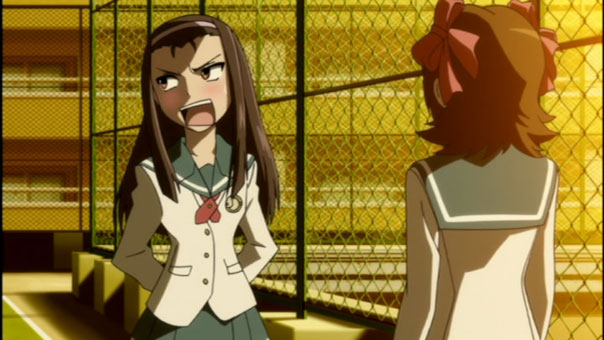
This is where we bring in the shows covergirl Amami Haruka. She attends and succeeds in an audition she believes to be scouting for new idol singers, but when she arrives in Tokyo she is promptly informed that, in reality, she has been enlisted as an Idol pilot – a Master, as it were – as she has a high affinity towards one of their Idols, Imber. There she meets the timid Yukiho and the token tsunderekko Iori, thus forming the character trifecta all these Sunrise shows center around. Then they blow up some asteroids and stuff. But there’s also another organisation with Idols which seems rather less altruistic in their intentions.
It’s a premise that, largely, plays to what were Sunrises strengths at the time – giant robots and a large, predominantly female ensemble cast. It’s the kind of show you’d have expected Sunrise to produce, to the point were leading up to the production I even did a post explaining what the show was going to be about, extrapolating all the way up to the shows ending based on the tropes common to Sunrises productions of the time – not just the HiME shows, but also things like Code Geass and Gundam SEED. The show actually hit a lot of those plot beats, too.
Which, ten paragraphs in, actually gets me to the point of Xenoglossia – the show is a huge meta-play on the expectations of the audience, right from it’s announcement up until its conclusion.
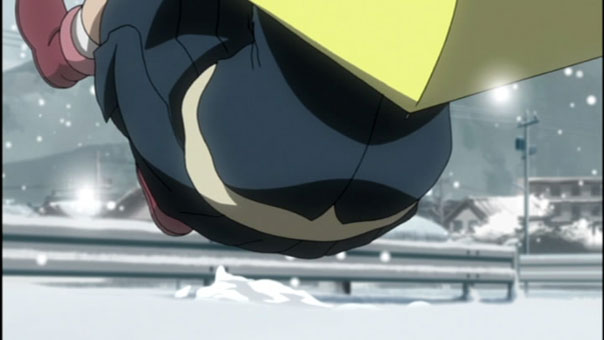
The show starts of innocently enough, as it were, with flashbacks to Harukas audition (at the point where we, or at least she, still thinks she is auditioning to be an idol), and the scene begins with her tripping over, one of her key character traits from the game. Haruka even looks more or less like she did in the games. So far, so iM@S.
That’s pretty much where that ends, though – the tripping up thing isn’t really ever a prominent thing beyond a nod in the shows first opening credit sequence. Whilst Haruka doesn’t look vastly different, that’s not entirely true of the other characters. Almost everyone on that cast has, at the very least, found themselves age-shifted, some slightly like Yukiho, others more radically like Chihaya. Pretty much the whole cast has had their character design modified, even beyond what’d be expected from the change of art style, at least subtly – Iori has had her hair made black, Yukiho has been given humongous boobs, Chihaya doesn’t look much like the original character at all beyond her hair colour. No-one has kept their game voice actress.

Which, as obnoxious as many found it, was kind of the joke. There’s absolutely no reason that this show had to be iDOLM@STER related. Infact, there’s absolutely no reason that the show couldn’t have just have been a continuation of the HiME franchise. It would not have been a stretch to slot the show into the HiME continuity somewhere between HiME and ZHiME – it’d probably even go some way to explaining what happened to what was presumably Earth between the two shows. Essentially, it’s a double troll on both those who were expecting Sunrise to do another HiME universe show, and on those expecting Sunrise to do for iDOLM@STER what ZHiME did for HiME.
Infact, it’s really not difficult to see how HiME characters would map onto their Xenoglossia counterparts – a few of them even have the same voice actresses. There’s no real reason why Haruka isn’t Arika. It wouldn’t be a stretch for Chihaya to have been Tomoe, or for Ritsuko to be Mai. Yukiho is Erstin Ho. This confoundment of expectations is extended throughout the rest of the shows production, as Yukiho best displays (and this is where things start to get spoilery for both Xenoglossia and the HiME shows).
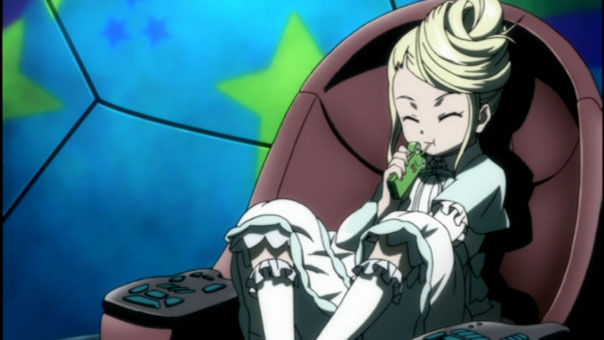
No, I don’t know where RIFFA fits into all that…
To get the big plot spoiler immediately out the way, as with Erstin in ZHiME, Yukiho ultimately reveals herself to be working for the other side, although unlike Erstin, Yukiho doesn’t immediately go up in a shower of green sparklies. The thing with Erstin is that they didn’t really signpost it blatantly – there’s a couple of mildly suggestive lines thrown innocuously into her dialogue, but otherwise it’s just something which mostly happened out of the blue.
Yukiho, on the other hand, they really couldn’t have made more obvious. The most blatantly obvious clue is the simple fact that she really is just Erstin, right down to most of the jokes surrounding her, but even beyond that the show liberally drops hints all over the place. The show actually drops enough information into the OP sequence for the observant viewer to fathom out what’s going on with that character. By the time it actually happens, you’d really not have to be paying attention for it to prove surprising.

But, again, expectations. You wouldn’t expect Sunrise to do something quite so blatant with the character immediately after ZHiME quite so obviously, but they did. They don’t really twist it the way you’d expect either – once Yukiho presses the “Go” button, as it were, she really goes for it. Even when Chihaya isn’t as affectionate toward her as she may have liked, she regrets nothing. She has no doubts about things, even as her best friend is practically killed as a result of her actions, and she remains that way until the end when she has a pretty brutal robot-fight with our heroine. It’s actually a really refreshing take on the character type.
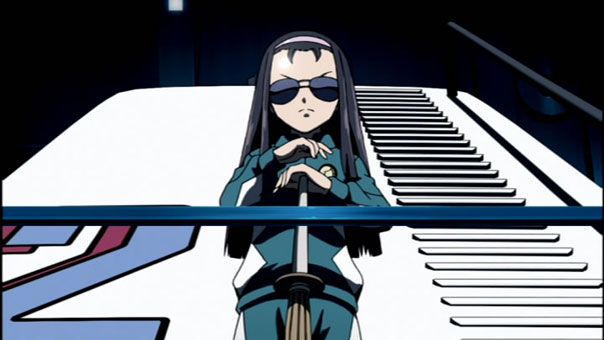
There’s a lot of amusing plot beats of the ilk spread throughout the show. One early episode had Iori doing her best Gunbuster Coach impression in attempting to improve Yukiho’s chances of being a pilot, which ultimately leads to Yukiho being crushingly defeated (not to mention her spouting some hilarious double-meaning talk). A later episode has Makoto and Azusa seemingly about to come to an important emotional realisation, but instead ends with Makoto being dumped by both Azusa and Mondenkind. Iori gets really screwed over in a couple of episodes as events unfold contrary to genre.
My absolute favourite moment of the type is Xenoglossias take on what I refer to as the “Sunrise Island Episode”. Anyone who watched a lot of Sunrise anime in the last decade will have some idea of what I’m talking about here – it’s the episode where they strand one of the protagonists and one of the antagonists together for a short time, where they eventually come to either some kind of emotional resonance or to the realisation that there is Another Way to solve their problems. They did it in Gundam SEED with Athrun and Cagalli. They did it in SEED Destiny with Shinn and Stellar. They did it in Code Geass with Lulu and Eufie. It’s a bonafide Sunrise trope.
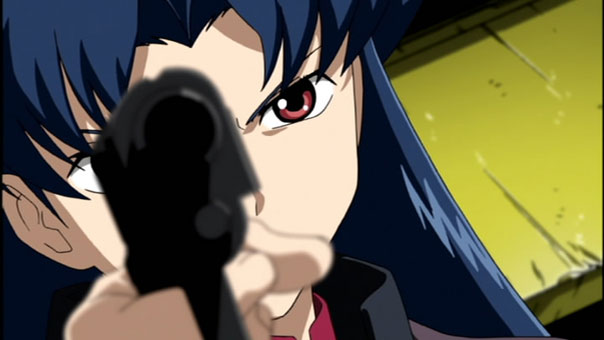
The Xenoglossia example is between Haruka and Chihaya, and concludes with Chihaya trying to murder Haruka for painting her giant robot pink. Hilarious.
There’s some other structural weirdness going on with the show as well. The pacing is fairly out-of-whack in comparison to other Sunrise titles – in particular, the shows halfway point is rather innocuous in the grand scheme of things, with the traditional switch to “serious business” mode held off unusually late into the shows run. Key events don’t happen when you’d traditionally expect them to. It’s deliberately a much slower and more sedate show than it’s stable mates. Not that it doesn’t get dramatic when it does go serious – Tokyo getting Big O Piston Punched into pieces is kind of spectacular.
None of this even gets into the odd otaku-obsession subtexts you can read into the Haruka/Imber relationship running throughout the whole show.
All of this is to say that Xenoglossia is arguably a more interesting show than it necessarily is a good one. This isn’t to say it’s terrible or anything. Although it’s not as good as My-HiME – it lacks that shows manic energy and a lot of it’s attention to detail – it’s an entertaining and well-made show which has a far better grasp of it’s internal logic, more coherence and more consistency in it’s quality than has been common for Sunrise shows in the last decade outside of Zegapain. It doesn’t fall apart under it’s own weight like so many of those have. Even removed from the Sunrise-related contexts that make the show more interesting, it’s worth revisiting.
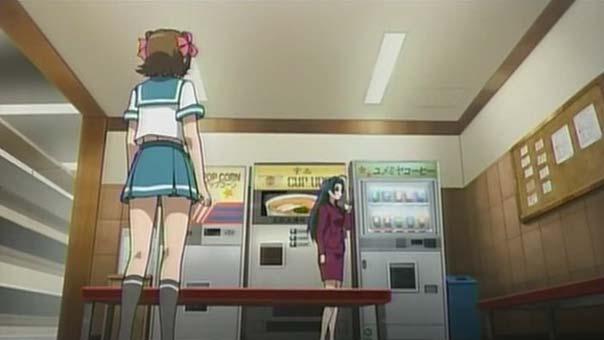
Yumemiya Coffee lol
Although, as the context-specific meta-humour goes, Sora wo Kakeru Shojou (another unhealthy obsession of mine) hits a lot of the same points as Xenoglossia from other angles. Almost as if they were upset that half the audience missed the point of Xenoglossia, what Xenoglossia did subtly, SoraKakeGirl takes great pleasure in doing as blatantly as possible. And hilariously, though I kind of feel a lot of the show, unlike Xenoglossia, will go completely over the heads of anyone who isn’t Sunrise literate.
Anyway, that’s all rather too TL/DR, but that’s all essentially why I don’t think Xenoglossia is a terrible show. The End.

2011-02-15
#
I don’t know whether to be worried or flattered… (I think I’ll go with “flattered” for the time being.)
2011-02-15
#
Not to mention the music for Xenoglossia was pretty awesome in itself.
2011-02-15
#
maybe Digi came up with it independently
2011-02-15
#
?
Okay, I’m starting to feel like I’m completely missing something here…
2011-02-15
#
Ooooh, the post title. I was completely oblivious to that ^^;
2011-02-15
#
On the other hand, there could be a connection, and we’ll never know. I once wrote an SI fanfic, for which I needed a fictional coworker… who I named her Chieko N., supposedly at random. As it turned out, I had a colleague called Chieko N.. I had to rename her in an update. To this day I have no idea if there ever was a connection.